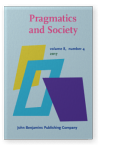Vol. 8:4 (2017) ► pp.477–497
Nations in news
Ordinary stereotypes in national TV news coverage of Spain and Germany
This contribution investigates the stereotyping of nations in TV news text. It compares the headline appearances of the names Germany and Spain on each other’s leading national evening TV news program during the peak of the European financial crisis (2011–13). The paper combines quantitative analysis of word-frequency and topic-distribution in a 621 headline-corpus, with in-depth case analysis of news values underpinning 32 extracted headline examples. A discussion of literature in media anthropology and Critical Discourse Analysis concludes with the argument that intentions and consequences of media discourse should be separated, whereas differences between ordinary and official language should not be overvalued. The case study shows how the textual display of Germans and Spaniards supports the everyday imagining of national belonging, how othering works through the labelling of nations as “economies”, and how negativity, competition and relatedness are prevailing values underlying the examined news headlines.
Article outline
- Introduction
- The pragmatics of othering: Mass media, nationhood and everyday life
- Cross-national comparison of TV news headlines on Spain and Germany
- Daily spotlights of German opponents and bad news from Spain
- Conclusions
-
References
